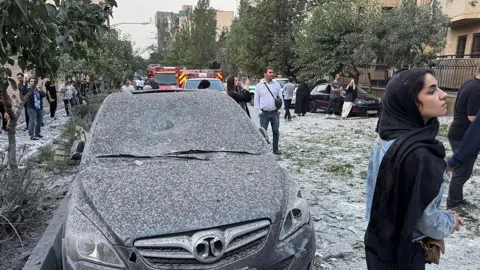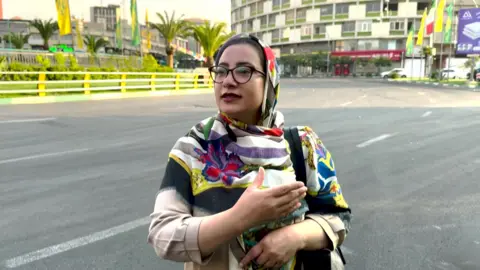In Iran, grief for civilian casualties but little pity for commanders
 Getty Images
Getty ImagesThe Iranian regime remains deeply unpopular, and many citizens have shown little sympathy for the assassination of senior military commanders, figures widely seen as responsible for brutal crackdowns on peaceful protests.
But reports of civilian casualties in last night's Israeli strikes have stirred a different reaction. Explosions rocked residential areas of Tehran and other cities, with people across the country reporting blast waves.
Israel insists it targeted nuclear and military sites, but images of damaged homes have sparked fear and anger among those opposed to war.
Iranian state media says 78 people were killed in the capital alone and more than 300 injured.
These people in Iran, who got in touch with BBC Persian, expressed their feelings:
"This incident was truly horrific, especially for us living very close to the explosions and I really hope that the situation won't get worse. This should not have happened – civilians in Tehran or any other city in Iran should not have been hurt," one person said.
"I'm not pro-Islamic Republic, but this issue is about Iran, it's about home. See how they are attacking us, destroying our infrastructure, killing our people," said another.
The regime is also being blamed for dragging Iran into a war through its support for armed groups in Iraq, Lebanon, and Gaza, as well as its ongoing nuclear programme.
Many Iranians are openly critical of their leaders for failing to protect the country. They point out the hypocrisy: authorities are quick to crack down on women who refuse to wear the compulsory hijab, but when it comes to identifying and preventing a major military threat, the same authorities seem powerless - despite all their political posturing.
 AFP
AFPHowever others expressed defiance and told international media that Iran should be allowed to pursue a civilian nuclear programme.
Ahmed Razaghi, 56, told Agence France Presse that it was "unacceptable" for Israel to "take away our nuclear capacity".
"So many scientists have worked hard for this, we achieved it ourselves, and now they want to take it from us. That means they're trying to impose their will on us. It's completely unacceptable."
Retiree Ahmad Moadi demanded a military retaliation.
"How much longer should we live in fear? They've eliminated so many university professors, so many PhDs, and then they go and negotiate? What does negotiation even mean at this point? What's left to say?"
The overall death toll from the Israeli attacks across Iran remains unclear, but some of the victims are beginning to be identified.
They include padel tennis player Parsa Mansour, whose death was announced by the Iranian Tennis Federation.
The statement said Mansour was on his way home from training last night when he died in the attacks, without specifying a location.
